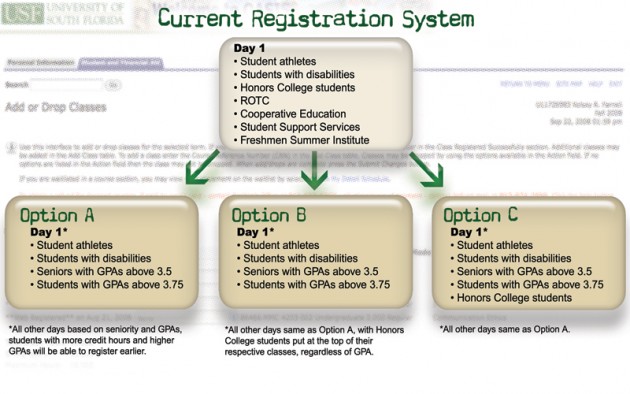Registration policy faces possible changes

If scholarships, job opportunities and parental approval weren’t motivation enough, good grades might earn students early course registration as well.
A new system has been proposed that would prioritize students’ registration based on GPA rather than just credit hours. Students in priority groups — such as honors and ROTC students — would lose their first day registration privileges in some of the proposed plans.
“There is no perfect registration system,” said Glen Besterfield, associate dean of undergraduate studies. “Life’s not fair, but we are looking for a system that is as fair as possible.”
Under the current system, athletes, students with disabilities, honors students, ROTC students and other groups are designated for priority registration. These approximately 4,660 students are assigned the earliest possible registrations. After that, registration priority is based solely on credit hours — more hours means earlier class selection.
Besterfield said he proposed three new options to make class registration as fair as possible.
Option A limits the first-day priority group to students with GPAs above 3.75, seniors with GPAs above 3.5, student athletes and students with disabilities.
Athletes and students who have limited mobility must have an opportunity to carefully plan their schedules, Besterfield said.
Students are then placed into classes (freshmen, sophomore, junior or senior) based on the number of credit hours they have completed. Seniority will give higher classes priority over lower ones, but higher-performing students will register before those with lower GPAs in their respective classes.
Because students are divided into classes, even the lowest performing seniors will still register before most juniors.
Option B uses the same system but puts honors students at the tops of their respective classes regardless of GPA. An honors junior, for example, would be the first of the juniors to register for classes, no matter his or her GPA.
Option C is the same as Option A but puts honors students in the first day of registration regardless of their grades.
Issues with the systems still need to be addressed, such as assigning incoming freshmen who do not have a GPA, Besterfield said.
Many students will only move a day or two if one of the proposed systems is installed, Besterfield said, but students in the current priority groups could see a drastic change.
For example, under Option A, a freshman in the Honors College with a GPA less than 3.75 will go from registering on the first day to registering on one of the last.
Besterfield said it is more about rewarding students who work hard than punishing those who do poorly.
“We want a system that promotes our values,” he said. “Why would we want a system that promotes mediocrity?”
The most realistic system is Option C, Besterfield said, since it preserves the Honors College’s registration privileges.
“We, as a University, must be able to recruit honors students,” Besterfield said. “We must raise the profile of this University.”
Stuart Silverman, dean of the Honors College, said priority registration is a big draw for honors students.
“College recruitment, like anything else, is a competitive business,” he said. “Every other university (in Florida) offers priority to Honors students except the University of Florida.”
If Options A or B are utilized, the Honors College would lose an edge in recruiting, Silverman said.
“We would not be decimated,” he said. “But some very bright students would choose to go elsewhere because our package of benefits would be less than other schools’.”
Nearly 2,000 students, however, may see their priority registrations revoked under all three Options. ROTC, Cooperative Education students, Student Support Services (SSS) and Freshman Summer Institute students are not given priority in any of the proposed plans.
SSS Director Reba Garth said her students — who are mainly low-income — will suffer under the proposed systems.
“A lot of our students have to work or do other things,” she said. “They might not have a 3.7 or 3.8 (GPA).”
In order to retain federal funding for the SSS program, Garth said, the University must “show an institutional commitment” to students in the program through its policies and procedures. Priority registration is an example of such a policy.
“Most (SSS) programs across the country have priority registration,” Garth said.
Besterfield’s proposals have received support from the Council of Associate Deans, Council of Academic Advisors, Enrollment Management Team and Student Government, he said.
If one of the new systems is selected, it could go into effect for fall 2009 registration.
Some students have voiced their concerns about the proposed systems.
“We are accounting students, so it’s really hard to get a high GPA,” said Kara Willis, a senior accounting major. “It’s already hard enough to get the classes I need. In our case, (the new system) might hurt us.”
Communication sciences and disorders senior Sabrina McCormick, an honors student, said she hopes the new system includes honors students in the priority group.
“One of the biggest benefits of the Honors College is priority registration,” she said. “I think GPA is a good idea for the rest of the school, though.”
Some students may be at a disadvantage under the GPA-based system, said Robin Medicus, a senior majoring in biology.
“I think it really affects the science majors, because the classes are very competitive to get into,” she said. “People go elsewhere if they can’t get the classes they need.”







